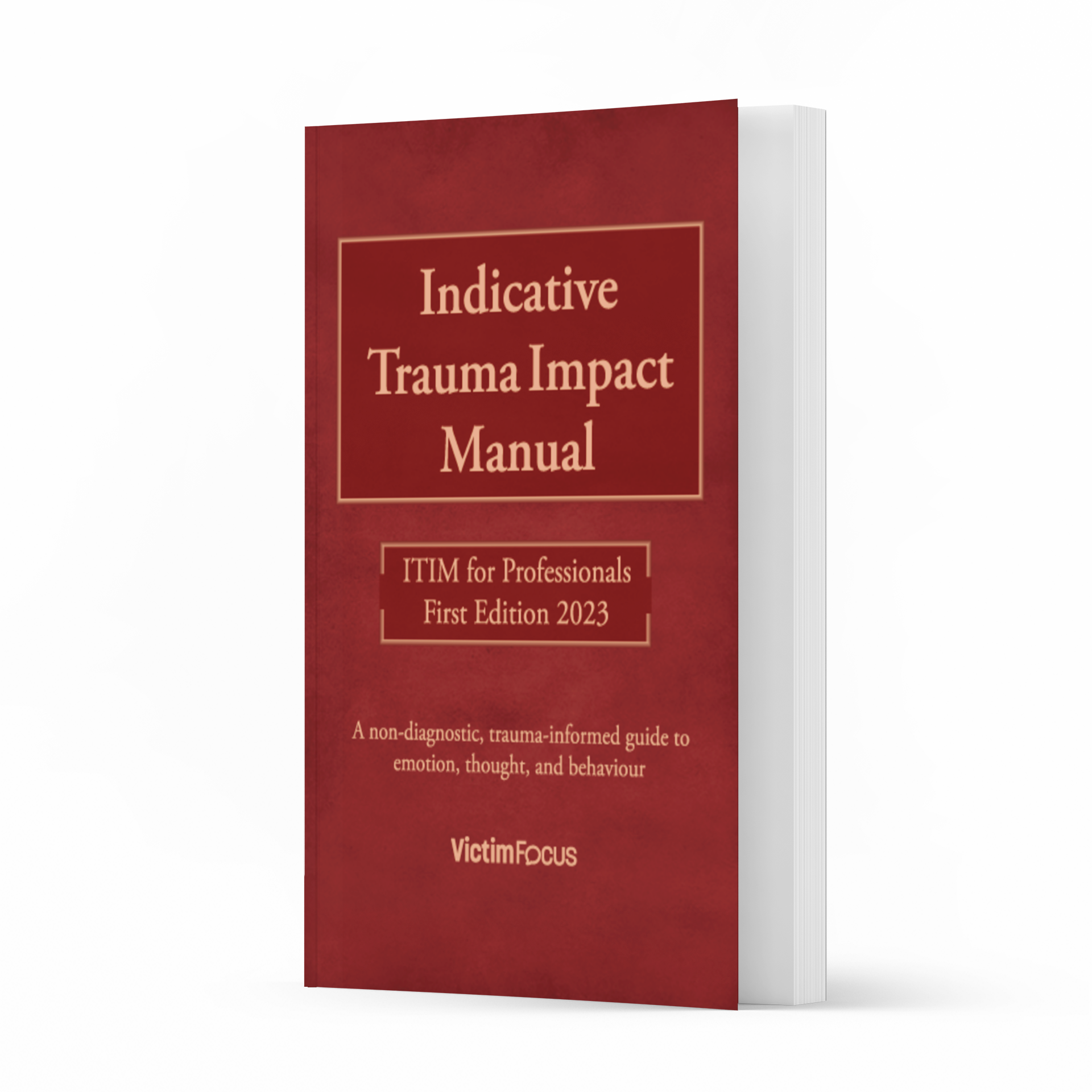The ITIM, the world’s first manual offering an alternative way of diagnosing mental disorders, is published
The ITIM is the world’s first non-diagnostic, anti-pathological, anti-suppressive manual of mental health
Summary of the press release
- The ITIM (Indicative Trauma Impact Manual) explains over 500 trauma reactions and coping mechanisms without associating them with mental health problems or disorders
- Provides accessible non-medical explanations for everything from heart palpitations to hearing voices
- AZ format with hundreds of emotional, psychological and physical responses to trauma, stress and injury
- Peer reviewed by 30 academics, professionals, trauma experts and people who have experienced trauma
- The ITIM will provide the first viable alternative to the DSM and ICD mental disorder diagnoses for professionals who do not wish to label or treat their clients/patients
- The ITIM sold 1000 copies in its first week of pre-order sales, with 50% of the orders being placed in the US
About the ITIM
The ITIM (Indicative Trauma Impact Manual) is the world’s first fully trauma-based manual of its kind, designed to identify, respond to, and understand every type of human trauma and emotion.
It was designed as an alternative to the DSM and ICD.
Building on decades of research, case studies, and evidence published by practitioners, academics, and scholars in the field, the ITIM equips progressive professionals with evidence-based, anti-oppressive, anti-blaming, and non-diagnostic information across a broad spectrum of human emotions , thoughts and behavior.
Building on the fast-growing consensus that trauma-informed, anti-suppressive practice is critical to how we understand society, ourselves, and our clients; This book offers the first comprehensive alternative to diagnostic manuals.
The handbook describes, explains, and explores everything from nightmares to self-harm through an A-Z of emotions, thoughts, and behaviors common to traumatized and distressed people. This edition also includes charts, theories, tools and peer-reviewed evidence throughout.
background information
Recent studies and NHS statistics have revealed that 1 in 5 people in the UK are taking medication for psychiatric disorders [1] and 1 in 3 people have been told they have a mental health problem [2]. In 2023, it was reported that child referrals to CAMHS had increased by 39% in one year [3]. Additionally, the number of young children prescribed antidepressants has increased by 41% since 2015 [4].
A trauma-informed approach to these rapidly rising numbers would suggest that stress, trauma, austerity, abuse, online harm, and other external factors (including the pandemic) are underlying this trend, rather than a true rise in “mental disorders.” The only model that can currently be worked with is the medical model of mental health (DSM and ICD) and therefore there was no alternative but to refer people to their doctor, to mental health teams and then to psychiatric drugs.
Quotations from authors
dr jessica taylor
“This year I have worked with people who have been exposed to all forms of trauma, abuse, violence and oppression for fourteen years, my entire career. I’ve never understood why almost all of them were told they had personality disorders, delusions, and mental health problems when in fact they all reacted naturally and normally to traumatic or stressful experiences. The ITIM is the first attempt to create something completely different. It is a first edition and will no doubt need many revisions and editions, but we have to start somewhere.”
“We simply cannot continue to diagnose and treat millions of people a year and continue to ignore the underlying trauma and root causes of their feelings, thoughts and behaviors. The reality of mental health care is that the true causes and solutions have been staring us in the face for decades. People are desperate, tired, overworked, traumatized, controlled, abused, exploited, confused, lost, scared and helpless. Neither of these experiences are diseases of the body or mind. Trauma-informed, anti-pathological approaches to mental health could change the world. This book could be revolutionary, and many thousands of practitioners have been waiting for something like this for decades. Nothing like this has ever been attempted and I am so proud to have written the ITIM with Jaimi.”
Jaimi Shrive: “I am very pleased with the recognition and reception that ITIM has already experienced. I think this is a demonstration of the shift through which people are willing to implement and adopt genuine trauma-informed approaches and practices into their work and perspectives. The ITIM has built on the excellent trauma-informed work of other scholars, academics, and practitioners, and their support has been invaluable to Jessica and I. In particular, our work complements and builds on the fast-growing Power Threat Meaning Framework (PTMF). I especially look forward to how professionals will receive the Baseline Trauma Tool. Given that humans are by nature survivors and how this plays out in modern societal structures, I think this tool will provide much-needed political and social context for understanding traumatized populations.”
Quotations from reviewers
“As a specialist lawyer for family law and an academic, I have been dealing with the pathologization of women in care proceedings and private child proceedings for a long time. Medical experts are often called upon in family law cases to provide opinions on their mental health and to make diagnoses that women did not know existed before the trial began. This book emphasizes that the dominant model of mental health is the “medical model” because of the need to label women and using the courts as a legitimate means of labeling women. The book is a really clear breakdown of the different approaches to mental health and offers a differentiated perspective that is well documented and supported. Breaking down key human emotions and physical responses, and emphasizing that they are normal responses to trauma, helpfully dispels myths that continue to be rife in society at large.” – dr Charlotte Proudman, lawyer and academic, Director of the Right to Equality
“In my opinion, the exhaustive list of trauma responses and coping mechanisms from A-Z is the highlight of the handbook and most valuable to clinicians and the general public. Understanding the broad spectrum of responses as a means of coping with trauma/stress allows for a shift in thinking from “symptoms” of a disease/disorder orientation to normal and expected ranges of responses given one’s history and exposure to stressors. That alone would be revolutionary.” – dr Roger McFillin, Licensed Psychologist, Executive Director of the Center for Integrated Behavioral Health
“I started reading and couldn’t put it down. I can only think I would have wished that 30 years ago when I was working with survivors so they could see in writing that they weren’t crazy. I wish I had it to show judges and childcare workers so they would understand the abuse they are inflicting on the mother who forced them to take drugs to get their children back (drug compliance). So many women could have picked that up and found themselves and said, “I’m ok, I’m not crazy”. I think of all the women I’ve seen in shelters who can be shown and told their abuse is real.” – Carol Wick, Trauma Therapist and President of Sharity Global
“As the authors say at the outset, ‘Everything has to start somewhere,’ and this book is an excellent start to expanding thinking in trauma-informed ways. It is a resource for practitioners who are willing to have an open mind and want to understand more about human experience in general and the effects of trauma in particular. It has so much to offer in terms of learning, all backed by a solid evidence base. There really is something for everyone.” – Fiona Gwinnett, CEO of Wight DASH
About the authors of the ITIM
The married academic team and VictimFocus directors, Jessica Taylor and Jaimi Shrive, developed the ITIM for thousands of professionals seeking an alternative to the DSM and ICD diagnostic approaches to mental disorders for human suffering and trauma.
dr jessica taylor is a Psychologist, PhD in Forensic Psychology, Co-Director of VictimFocus, Sunday Times bestselling author, public speaker, trainer and researcher. She specializes in trauma-informed approaches to abuse, violence, trauma, distress and oppression. Her work focuses on the psychology of victim blame and prejudice, and the ways in which those subjected to abuse and trauma are likely to be reframed as disturbed or mentally unstable.
Jaimi Shrive is a PhD student pursuing a PhD in Politics, specializing in how international and national politics are changing the way governments respond to violence and abuse against women and girls. She is co-director of VictimFocus, a trainer, speaker and author that creates educational resources for professionals working with trauma, abuse and violence. She is co-author of several public and confidential reports on the impact of violence, abuse, vicarious trauma and misogyny in policing and social care services.
Links to the ITIM
The book is available worldwide from the VictimFocus Store and Amazon
Release date April 3, 2023
Link: https://victimfocus-resources.com/products/indicative-trauma-impact-manual-2023-itim-pre-order
Email: Jessica@victimfocus.org.uk and Jaimi@victimfocus.org.uk
Website: www.victimfocus.com





